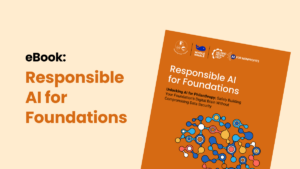Trust based philanthropy is having a moment. It’s reshaping how funders and grantees work together.
Instead of dictating how grantseekers should use their awards, funders are removing strict grant requirements in favor of trusting their partners to do what is best for the community. This approach removes rigid requirements and instead fosters transparency, efficiency, and stronger, more equitable relationships.
Many grantmakers use this giving philosophy as a springboard to create meaningful, multi-year relationships with grantseekers. In this article, we’ll define what trust based philanthropy is and explore how appropriate grant administration software can make it even easier to implement.
We’ll also explore how the right grant administration software can make it easier to put these values into practice.
What is trust based philanthropy?
Trust based philanthropy is a grantmaking philosophy built on transparency, humility, and equity. Instead of funders controlling how awards are used, it empowers grantees to make the best decisions for their communities.
In practice, it requires a streamlined approach to applications and reporting. With an open line of communication, funders and grantseekers gain a deep understanding of each other’s missions, helping each other add strategic value to the community while reducing unnecessary administrative barriers.
Although different from other philanthropic approaches, trust based philanthropy recognizes that the best results come when funders and grantees work together as partners.
Building trust is reshaping the future of grantmaking
Across the philanthropic sector, funders are rethinking the way they work with the communities they serve. Although there’s been a recent push to develop more trusting relationships, over half of foundations report that they already incorporate trust based philanthropic principles into their giving.
Lengthy processes and rigid funding requirements can discourage well-intentioned grantseekers from applying or building connections with grantmakers. These processes require significant time and resources. When community needs are urgent, grantseekers may be forced to seek funding elsewhere.
Trust based philanthropy emphasizes transparency, shared goals, and lasting relationships. By fostering strong partnerships, funders can remove many of the administrative barriers that slow the flow of funding.
When collaboration is grounded in mutual understanding, funders and grantees can create the right conditions for deeper community engagement and greater impact.
Core principles behind the movement
While there is no single “right” approach to philanthropy, trust based philanthropy gives grantseekers greater freedom and creativity in their projects. Empowering them to address needs as they arise enables a far-reaching impact within the community.
The guiding principles of trust based philanthropy help funders move beyond transactional giving toward relationships that foster meaningful, long-term change.
Multi-year, unrestricted funding
Trust based philanthropy operates on a multi-year funding basis. By offering funding over several years without strict project restrictions, grantees gain the stability to plan long-term and adapt to changing needs.
Unforeseen events happen. When grantseekers have access to flexible funds that can be deployed as soon as a need arises, they not only address challenges quickly but also strengthen trust within the community.
Streamlined applications and reporting
Trust based philanthropy paves the way for meaningful relationships because funders understand they can rely on grantees to deliver impactful work within the community. Once this trust is established, funders can streamline application and reporting processes, making it easier for grantees to access needed funding.
Simplified processes reduce the strain on under-resourced teams. Reporting requirements become less of a burden, as impact can be clearly measured and shared with stakeholders.
Transparent, responsive communication
Open communication keeps funders and grantees aligned. Regular, honest conversations help funders and grantees address challenges together, build mutual respect, and identify new opportunities for impact.
Reducing the need for multiple funding applications in favor of ongoing dialogue ensures that community support is timely, strategic, and responsive to emerging needs.
Support beyond the grant check
Philanthropy often does not follow through once the funding agreement is finalized. Many funders want to work alongside grantseekers to provide strategic support in other areas.
In these instances, grantmaking extends beyond financial contributions to include capacity building, peer connections, and strategic advice, helping grantees strengthen their organizations as a whole.
Why grantmakers are embracing trust based models
This shift to trust based giving is a response to sector-wide calls for greater equity and less burnout among grantee staff. Our sector survey with SmartSimple found that trust based practices often lead to stronger partner relationships, better data-sharing, and a shared commitment to long-term outcomes.
When grantees can speak openly about successes and struggles, they’re better able to use funds effectively, and funders gain a clearer picture of real, immediate community needs.
Common challenges to shifting toward trust
Even with clear benefits, a change in philanthropic approaches isn’t always easy. Some funders worry about struggling to align new approaches with compliance requirements. Others face resistance from internal stakeholders who lean toward more traditional funding philosophies.
The key to addressing these challenges is to:
- Tackle the underlying concerns early
- Identify where flexibility is possible
- Clarify impact measurement plans
Addressing these concerns as they arise ensures everyone understands the strategic shift in giving and funding.
Practical steps for adopting trust based grantmaking
Changing your philanthropic approach can feel daunting, especially if you’re accustomed to a more traditional giving framework. However, adopting trust based grantmaking into your approach doesn’t need to become a challenge.
Follow these practical steps:
- Review reporting requirements: Focus on collecting only the information you truly need to demonstrate progress.
- Invest in training: Help staff develop the skills to manage relationships with an equity mindset.
- Right-size processes: As outlined in our guide to right-sizing practices, match requirements to the size and scope of the grant to keep things manageable for grantees.
Small, meaningful steps to create more trusting relationships with your grantees can make a significant impact on the local community.
How technology can help build trust
Nearly two-thirds of grantmakers and foundations are shifting toward trust based giving principles.
These grantmaking principles are made easier by using the appropriate tools, such as:
- Grant management software: Streamlines applications, reporting, and communication in one place, making it easier to access necessary information.
- Donor management software: Gives staff a central view of relationships, helping them respond quickly and personally.
- Grant tracking tools: Provide visibility into progress without adding extra work for grantees.
The best grant management software integrates seamlessly into existing workflows, making grant reviews and approvals more efficient and enabling grantseekers to access funding opportunities more quickly.
Rethinking the role of grant management tools
Technology has a way of complicating relationships, causing unnecessary frustrations if not used properly. The most effective grant management systems are flexible, intuitive, and designed to make processes more transparent.
When funders spend less time on administrative tasks, they have more time to connect with and support grantees, leading to stronger outcomes for everyone.
For more on how these tools support authentic partnerships, see our article on practicing trust based philanthropy.
Start a conversation about the future of grantmaking
Although trust based philanthropy isn’t a new funding philosophy, it’s a strategic shift toward a more collaborative, people-focused way of making change. Pairing this approach with the right technology helps funders build meaningful, long-term relationships with the organizations they support.
Ready to explore what trust based philanthropy could look like for your organization?
Start a conversation with Foundant to learn how our grant management solutions can help you create lasting, trust-based partnerships.

